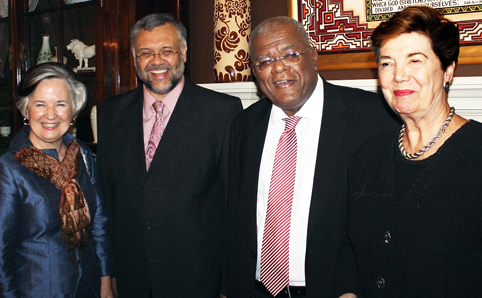Latest News Archive
Please select Category, Year, and then Month to display items
12 January 2024
|
Story Nonsindiswe Qwabe
|
Photo Sonia Small
 Since joining the UFS in 2008, Dr Grey Magaiza has worked extensively on approaches that can foster the socio-economic transformation of societies.
Since joining the UFS in 2008, Dr Grey Magaiza has worked extensively on approaches that can foster the socio-economic transformation of societies.
“The future should be one where communities can decide on their development agenda and futures. That’s the most important for me.” Dr Grey Magaiza, Deputy Director of the Centre for Gender and Africa Studies (CGAS) and Head of the Community Development programme on the Qwaqwa Campus, is passionate about capacitating communities to be agents of change and advancement. His vision for the future emphasises the empowerment of communities to take charge of their development by actively participating in decision making and the implementation of development projects that can improve their lives.
Since joining the UFS in 2008, Dr Magaiza has worked extensively on approaches that can foster the socio-economic transformation of societies. Over the years, he has crafted his research speciality into one that he is most proud of – being an interdisciplinary scientist immersed in the development of communities.
“I’m in a fortunate position of researching what I like. I say ‘fortunate’, because I’ve taken the time to understand what I’m passionate about, which is the overall field of rural livelihoods and livelihood futures – in short, community development. My research starts from an engaged university, understanding the elements that a university must use to enhance transformation and relevance to its immediate community in terms of development.”
One of the ways he has done this is by looking at social entrepreneurship as a development approach for young people in a rural setting. Through workshops with non-profit and civic organisations in Qwaqwa, Dr Magaiza has been helping these organisations to map out their needs and actively meet them through the involvement and support of external role players.
“We understand that communities are part of the national development agenda, but even that national agenda respects community knowledge and intentions and allows communities to shape their identity. A critical enabler of this is community organising. You bring back the capacity in communities to have dialogues on issues affecting them as spaces for engagement, knowledge exchange, and for people to just talk about their way forward.”
By enabling communities to define their development agenda, they can address their specific needs, challenges, and aspirations, he said. “When I look at livelihood futures, it’s quite an exciting aspect of my work – it’s like looking into a fortune tellers’ globe, because you’re not deciding for communities what they should do, but the communities themselves take those decisions.”
Rasool lauds our university
2011-10-24
 |
| At the dinner at the residence of the South African Ambassador to the USA, Mr Ebrahim Rasool, were, from the left: Prof. Debra Stewart, President of the Council of Graduate Schools in the USA; South African Ambassador, Mr Rasool; Prof. Jansen; and Prof. Molly Corbett Broad, President of the American Council on Education (ACE). |
The Ambassador for South Africa to the United States of America (USA), Mr Ebrahim Rasool, recently hosted Prof. Jonathan Jansen, Vice-Chancellor and Rector of our university and a group of representatives from major science councils, foundations and universities at his home in Washington DC. Our university is the first South African university to be hosted at the official home of the Ambassador.
“The University of the Free State has shown South Africa and the world how to work with the past and how to make the past work for them. “You are a thought leader who had the privilege not to be comfortable with your own ideas of history; you understood the need to change and embraced it. You have moved the fastest towards racial and human togetherness of all the South African universities,” Mr Rasool said.
Prof. Jansen responded by saying that Africa needed strong academic universities and that had to be the focus of tertiary institutions across the continent. “We must create opportunities for people to be together and to learn from each other. The UFS is an experiment of human togetherness – and this experiment is taking off,” he said.
During his visit to the USA, Prof. Jansen also discussed research partnerships and new placements for UFS staff and students through exchange visits.